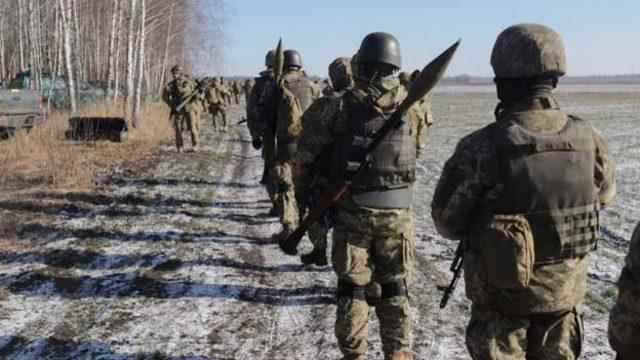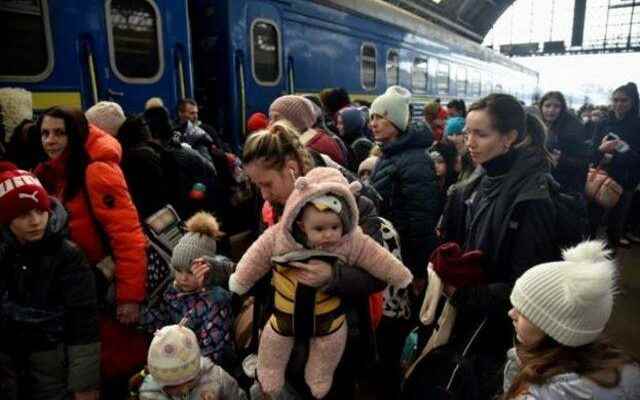The Russian invasion of Ukraine has created unprecedented danger and anxieties in recent years. It had long been unprecedented for a nuclear power to launch a war of aggression to invade its neighbor. Some experts interpreted this as the biggest crisis since the Second World War.
All of this raised many questions about the impact of the occupation and what might happen next.
BBC reporters sought answers to the most frequently asked questions.
Lyse Doucet, Diplomatic Correspondent, Kyiv
Humanitarian corridor attempts in the city of Mariupol have failed.
But Ukraine cannot control its airspace. Many airports were attacked by Russia both from the air and from the ground. Much of the country is too dangerous to make such a relief flight.
Aid to Ukraine is sent by road from countries bordering the West.
Cities in the West of the country, such as Lviv, which were not yet affected by the Russian attacks, have turned into a humanitarian aid distribution center for humanitarian aid.
Ukraine’s western neighbors have launched special emergency operations for this crisis of unprecedented scale since the Second World War.
In every war or disaster, resources and access determine the response. Although there are aid materials sent to the cities under siege, they cannot approach these cities due to Russian artillery fire.
Russian state media, on the other hand, shows the aid that Russia distributes in the occupied areas.
Can the United Nations send troops to Ukraine?
Lyse Doucet, Diplomatic Correspondent, Kyiv
Before the United Nations can send troops, it must first receive approval.
This approval process usually goes through the UN Security Council.
The fact that Russia is a permanent member of the UN Security Council makes such approval impossible.
Russia even denies that it has invaded its neighbor, claiming it is a “special military operation” to protect Russia from threats.
Although Ukraine repeatedly called for a no-fly zone, this request was flatly denied.
Western countries know that this will lead to war with Russia.
The no-fly zone not only has to bring down Russian planes, it may also require attacks on Russian troops on the ground.
Why aren’t more trains being sent for those who want to escape from Ukraine?
Lyse Doucet, Diplomatic Correspondent, Kyiv
Most of the trains leave on time despite the war.
However, in some places, such as Irpin, in the west of Kiev, the trains cannot be made because the rails are damaged.
When I visited the 19th century railway station in Kiev, I noticed that some trains to the West were not as crowded as they used to be.
But the trains leaving the country are still completely full.
Would Putin dare to seize Kiev at the cost of demolishing it?
Frank Gardner, BBC Security Correspondent
Putin is clearly impatient. It seems that Russia has entered a new phase in this conflict.
Howitzers, rocket launchers, UAVs and missiles brought their missiles closer to the cities of Ukraine.
These include the capital, Kyiv.
Maybe we can look at the previous examples of the wars that Russia could wage to seize a city. These are Grozny in Chechnya and Aleppo in Syria. Street-to-street clashes destroyed most of the cities.
Would Putin do this to Kiev? It’s hard to predict.
Kyiv is a historical city. Before Moscow existed, Kyiv was the capital of the Russian Empire.
If he destroys Kiev, it is not welcome in Russia either.
But he thinks Putin will do anything to bring Ukraine to heel.
He will prefer a ruined Ukraine on his side to a Ukraine that is a member of the EU and NATO.
Could a major war break out between Russia and NATO?
Jenny Hill, BBC News, Moscow
This is not impossible and this is the reason why NATO did not send troops to Ukraine.
Russia’s leader Vladimir Putin said countries that would intervene in a “special military operation in Ukraine” would face “history of unprecedented serious consequences”.

Many think this is a reference to the use of nuclear weapons.
Although the seriousness of Putin’s rhetoric is debatable, his recent unpredictable behavior has many in the West worried that Putin will push the nuclear button.
Putin, on the other hand, says they entered Ukraine only to protect the Russian-speaking people in eastern Ukraine.
But no one is sure what the game plan is.
He says he doesn’t want to take over Ukraine. But he had said before that he did not want to invade Ukraine.
From what he has written and said so far, we understand that he sees NATO as a great threat to Russia and wants to change its structure in Eastern Europe.
Since 1997, many countries neighboring Ukraine, Belarus and Russia joined NATO.
If Russia attacks these countries, NATO has an obligation to respond.
As Russian forces advance west, the likelihood of deliberate or accidental firing at NATO countries will increase.
If Russia uses chemical weapons, will NATO step in?
Lyse Doucet, Diplomatic Correspondent, Kyiv
This question is on the minds of all NATO members.
But the countries in the alliance do not want to be drawn into this conflict, except for the aid of arms and ammunition.
The most fundamental principle of NATO is collective defense. An attack on a member is considered an attack on all members.
But this is not the case outside the borders of countries.
Although Russia says it has no plans to invade another country, NATO members think this threat continues.
How would NATO react if Russia invaded all of Ukraine?
Jenny Hill, BBC News, Moscow
This is a disaster scenario for NATO. Although the number of NATO troops in the region is increased, the alliance does not want to enter into conflict with Russia.
There are those who think that instead of losing the whole country, Kiev can make some concessions to Russia and give up some of its territory to stop the conflict.
But this scenario seems difficult to realize because Kyiv does not want to enter into such a bargain.
Moreover, there are those who think that this may encourage Putin.
Regardless, most analysts think Russia will have a hard time dominating Ukraine in the long run.
What is Russia’s motivation?
Jenny Hill, BBC News, Moscow
We do not know the exact answer to this question.
Putin says the Russian-speaking people in eastern Ukraine were subjected to “genocide” by the Kyiv government. But there is no evidence of this.
He wants Ukraine to relinquish part of its territory in the east. These include Crimea, which it annexed in 2014.
It also demands that Ukraine renounce its desire to join NATO.
Could he want even more? Maybe. We know that he sees NATO and the former Soviet countries that have joined this alliance since 1997 as a threat.
Moscow has demanded changes in NATO’s structure before.
He demanded that Germany return American nuclear weapons from his country to the United States.
Some analysts think Putin wanted to portray the Soviet Union in a different way.
We know that the disintegration of the USSR caused him great sadness.
